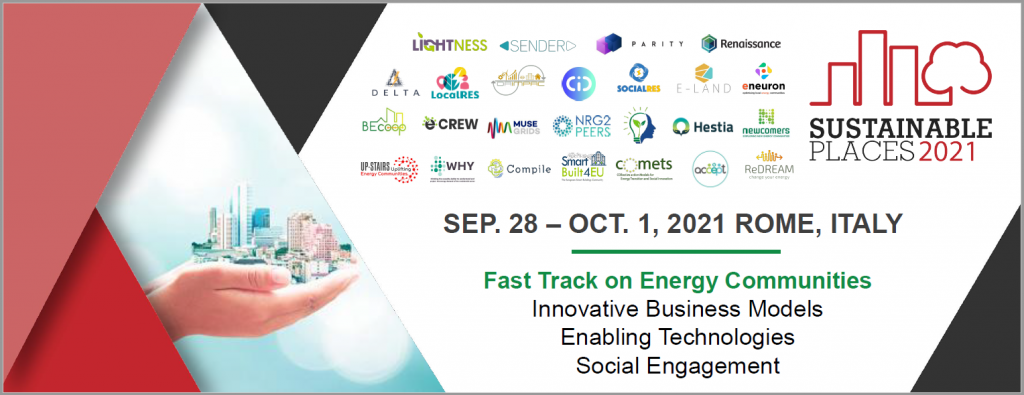"Fast Track on Energy Communities in Europe" workshop
28th and 29th September, 2021

[pdf-embedder url=”https://www.sustainableplaces.eu/wp-content/uploads/2021/09/Fast-Track-on-Energy-Communities.pdf” title=”Fast Track on Energy Communities”]
Energy communities are initiatives whose primary objectives are non-commercial, which operate on a geographically bounded scale and have some sort of democratic control by participants. Even if this definition has not yet reached an overall agreement, peer-to-peer (P2P) energy trade refers to either 1) the exchange of energy directly between members of a local energy community (whether households or small enterprises), or 2) the organization of an internal market by such an energy community, in which the latter acts as an energy provider. However, there is still a need for clear guidance, education, and support with respect to the methodologies and current practices for the set-up and take-off of successful energy communities, both on a local and at the EU level. Current practices and instruments to co-create, strengthen, make attractive and multiply energy communities, applied across Europe, clearly face several challenges. Moreover, one of the main obstacles that remains is users’ understanding and acceptance of collective actions in energy communities and benefits of smart grids. This is accompanied by the lack of user-friendliness, reliability – and therefore lack of credibility – cost-effectiveness, incentives schemes and regulatory and educational campaigns at the MS level. Also, calculation methods overlooking consideration of behavioural aspects, and demand response mechanisms and services, typically do not enable realistic prediction of performances and adoption of innovative technologies, thus hindering their market uptake.
To meet these challenges, aim of the workshop was to bring to the table and debate several experiences, developed methodologies, angles of observation, and lessons learned from a set of recent H2020, and Lighthouse projects. Outcomes of this workshop aim to contribute to the next generation of energy communities to:
- Become more a) reliable; b) user-friendly and attractive; c) cost-effective for the customers
- Become more a) self-sufficient and b) interactive for the grid, resolving issues such as access the grid and grid reluctance for the customers on the network
- Be compliant with EU and MS legislations in order to instil trust in the market and incite investments in energy efficient buildings
- Offer support in decision making, especially on adoption of RES, better purchases and guiding building users towards more sustainable behaviour patterns
- Increasingly reflect the smart dimension of the community
The interactive discussion focused on the different technical, financial, and social barriers and challenges as well as identifying possible project synergies while highlighting policy-making guidelines.
This workshop consisted of four 90-minute blocks that cluster various EU projects related to European energy communities, as follows:
Business Models (Chaired by Sylvia Breukers, Duneworks) – 15:30 – 17:30, 28th Sept., virtual
- DECIDE
- DRIMPAC
- DELTA
- WHY
- NEWCOMERS
- SocialRES
- BECoop
- COMPILE
"Business Models" cluster video recording
Social Engagement (chaired by Simona D’Oca, Huygen Engineers and Consultants) – 15:30 – 17:00, 29th Sept., hybrid
- RENAISSANCE
- COMETS
- SENDER
- ECREW
- LIGHTNESS
- REDREAM
- HESTIA
- UPSTAIRS
- NRG2PEERS
"Social Engagement" cluster video recording
Technologies (Chaired by Fabio Apra, R2M Solution) – 11:00 – 12:30, 29th Sept., hybrid
- ELAND
- IFLEX
- LOCALRES
- MUSE GRIDS
- SMARTBUILT4EU
- ENEURON
- ACCEPT
- PARITY
"Technologies" cluster video recording
A 90-minute hybrid “Wrap-Up” session on 29th September from 15:30 – 17:00 collected and present the findings from the above three sessions.
